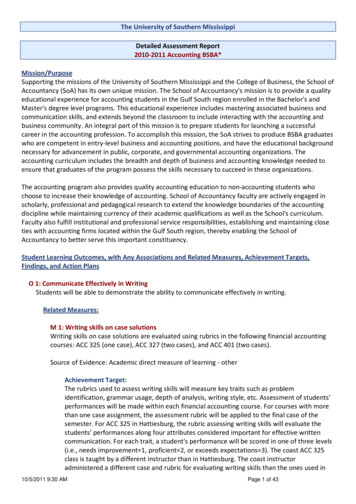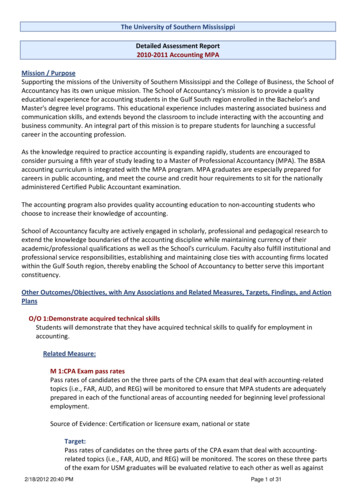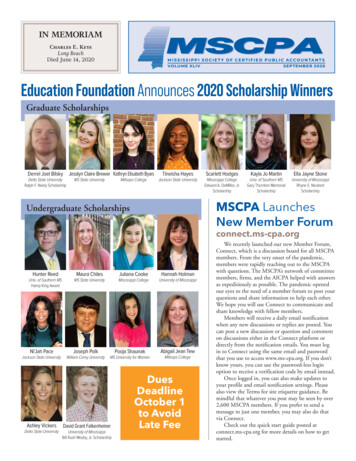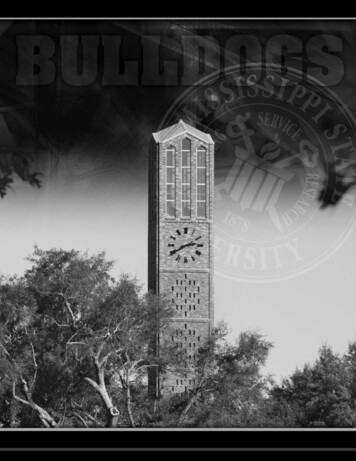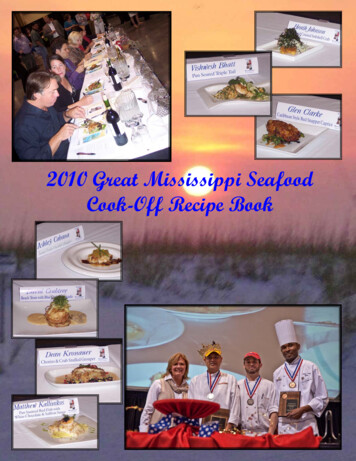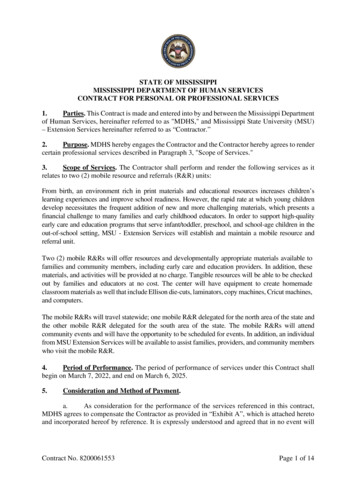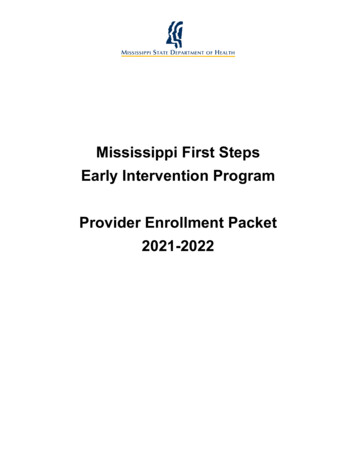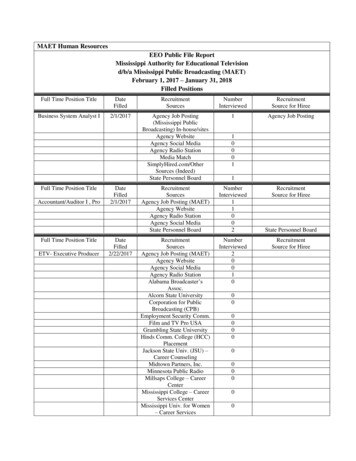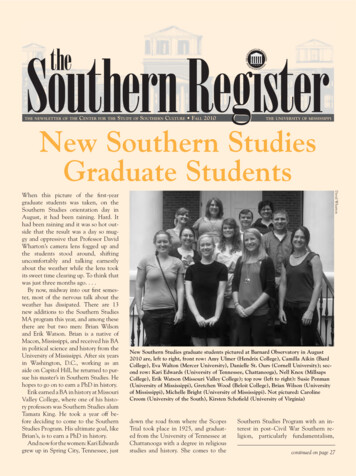
Transcription
thethe newsletter of theCenter for the Study of Southern Culture Fall 2010the university of mississippiNew Southern StudiesGraduate StudentsDavid WhartonWhen this picture of the first-yeargraduate students was taken, on theSouthern Studies orientation day inAugust, it had been raining. Hard. Ithad been raining and it was so hot outside that the result was a day so muggy and oppressive that Professor DavidWharton’s camera lens fogged up andthe students stood around, shiftinguncomfortably and talking earnestlyabout the weather while the lens tookits sweet time clearing up. To think thatwas just three months ago. . . .By now, midway into our first semester, most of the nervous talk about theweather has dissipated. There are 13new additions to the Southern StudiesMA program this year, and among thesethere are but two men: Brian Wilsonand Erik Watson. Brian is a native ofMacon, Mississippi, and received his BAin political science and history from theUniversity of Mississippi. After six yearsin Washington, D.C., working as anaide on Capitol Hill, he returned to pursue his master’s in Southern Studies. Hehopes to go on to earn a PhD in history.Erik earned a BA in history at MissouriValley College, where one of his history professors was Southern Studies alumTamara King. He took a year off before deciding to come to the SouthernStudies Program. His ultimate goal, likeBrian’s, is to earn a PhD in history.And now for the women: Kari Edwardsgrew up in Spring City, Tennessee, justNew Southern Studies graduate students pictured at Barnard Observatory in August2010 are, left to right, front row: Amy Ulmer (Hendrix College), Camilla Aikin (BardCollege), Eva Walton (Mercer University), Danielle St. Ours (Cornell University); second row: Kari Edwards (University of Tennessee, Chattanooga), Nell Knox (MillsapsCollege), Erik Watson (Missouri Valley College); top row (left to right): Susie Penman(University of Mississippi), Gretchen Wood (Beloit College), Brian Wilson (Universityof Mississippi), Michelle Bright (University of Mississippi). Not pictured: CarolineCroom (University of the South), Kirsten Schofield (University of Virginia)down the road from where the ScopesTrial took place in 1925, and graduated from the University of Tennessee atChattanooga with a degree in religiousstudies and history. She comes to theSouthern Studies Program with an interest in post–Civil War Southern religion, particularly fundamentalism,continued on page 27
Dthei r e c t o r’sCo l u m nIf you have been paying any attentionPublished Quarterly byThe Center for the Study of Southern CultureThe University of MississippiTelephone: 662-915-5993Fax: 662-915-5814E-mail: cssc@olemiss.eduwww.olemiss.edu/depts/southIN THIS ISSUEFall 20101 New SST Graduate Students Fall 20102 Director’s Column: “Bear Necessities”3 Living Blues News4 In Memoriam4 Gammill Gallery Exhibition Schedule4 Brown Bags: January & February 20114 Gammill Gallery Schedule5 Southern Studies Alumni News7 2011 Oxford Conference for the Book8 Southern Studies on the Road8 Two SST Positions Announced9 Q&A with SST Professor Robinson10 Fall 2010 Brown Bag Report11 Winter Institute Summer Program12 Southern Literary Trail Events12 Contributors13 Southern Foodways Alliance News17 Reading the South: Reviews & Notes21 Carol Fitzgerald: Collector, Researcher, Independent Scholar23 2011 Mississippi Delta Literary Tour24 2011 F&Y: “Faulkner and Geography”25 Clarksdale’s Tennessee Williams Festival26 Columbus’s Tennessee Williams Tribute28 Mississippi Institute of Arts and Letters30 Wanda Rushing Edits New Encyclopedia Volume on Urbanization32 Southern Culture Catalog Items36 Address Section/Mailing List Form/Friends Information and FormREGISTER STAFFEditor: Ann J. AbadieGraphic Designer: Susan Bauer LeeMailing List Manager: Mary Hartwell HoworthEditorial Assistant: Sally Cassady LyonLithographer: RR Donnelley Magazine GroupThe University complies with all applicable laws regarding affirmative action and equal opportunity in all its activities and programs and does not discriminate againstanyone protected by law because of age, color, disability,national origin, race, religion, sex, or status as a veteranor disabled veteran.Page 2to developments at theUniversity of Mississippi in the past few months, you know that our sports teamswill soon have a new on-field mascot. Several years ago, the University removed itsColonel Reb mascot from the field because it, with its close ties to the Confederacyand Lost Cause, discouraged the kind of unity that universities seek and suggestedour university has not confronted racism and embraced diversity. In the past fewmonths, the University conducted a complicated, multistep, student-led process toencourage discussion of a new mascot. In October, a vote by students, alumni, faculty and staff members elected the Black Bear, to be known as Rebel Black Bear.The issue has been the subject of much discussion and a surprising amount of mediacoverage. People around here seem to fall into four camps. Some reject the new mascot by saying that Colonel Reb is a perfectly good symbol, unique to the Universityand loved by many of its students and alumni, and that anything else will be a blandand meaningless advertising image. Another group also rejects that there is a mascot issue; they say that a mascot only involves sports and should not take up our attention as scholars, teachers, and students. Another group, with views rarely heardin the press, argues that no changes of consequence are likely until the Universityof Mississippi makes wholesale image changes, jettisoning the Confederate nickname Rebel and maybe its Lost Cause affiliate, the term Ole Miss. They want morechange than a black bear is likely to deliver. Finally are those who believe the mascot change can do some good, and they welcome an image more likable and lesstroublesome than Colonel Reb.Southern Studies has people in all four camps, with students and alumni servingas leaders of both the new mascot selection process and the keep-the-Colonel faction. It’s fair to say that the faculty members I know fall into some combination ofcamps two through four.I will be delighted to have a black bear as a mascot, at least in part because a blackbear can mean far more things to more people than an image like Colonel Reb.Simply as Mississippi references, bears were once common and environmentally important, almost became extinct, and now are coming back. (If one wants to see positive traits in black bears, one can say that Mississippi black bears are survivors. Onecan also read in the Environment volume of The New Encyclopedia of Southern Culturethat the black bear is agile and though omnivorous is usually vegetarian.) Mississippi bears were important as both metaphors and living animals to William Faulknerand Theodore Roosevelt. Beyond Mississippi, bears have such a range of associationsthat everyone should be able to find an appealing or at least intriguing point of reference. They scavenge, hunt and fish, hibernate, protect their young, and seem tosmile. They are huggable for people who want hugs, destructive for those who wantdestruction. In popular culture, bears include Winnie, Smokey, Yogi, Fozzie, Baloo,the Berenstain Bears, and Care Bears, and they have associations with Goldilocks,Russia, constellations, the stock market, and countless sports winners and losers.This wide range of associations seems likely to prove important, because the ColonelReb mascot seems to have had the potential to evoke only a narrow range of associations—military or ex-military, Confederate, Lost Cause. Beyond that, one wouldhave to stretch to find any associations outside past university sports teams.It is easy to grow weary of this issue and the attention it receives, but the relevance of mascot issues for Southern Studies encourages a few comments. First, images matter for universities, and we want images that at least have the potential tospeak for everyone on campus. It seems likely that for a while, a number of peoplewill hate the black bear mascot, but in the long run it has some potential to unify inways a mascot that reminds people of the Confederacy does not. Second, we wantUniversity images that do not allow (or even encourage) people who might visit, attend, or work for the University to assume the worst.And third, in Southern Studies, there is a question of academic subject matter.continued on page 3Fall 2010The Southern Register
It is particularly important to have images with multiple associations to makeclear that the study of the South doesnot start and end with issues related tothe Confederacy and its memory. As weemphasize in classes, scholarship, encyclopedias, conferences, magazines,and other public programs, our goal isto study all people in the South, andall issues, at all periods of the region’spast, present, and future, with academicmethods that will continue to change.Studying the Civil War is crucial, anda current library exhibition and recentPorter Fortune Jr. History Symposiumshow the liveliness of that study. Butwe do not want to limit our study toanyone’s definition of the South. InSouthern Studies classes, faculty haveoften chosen to teach mascot issueswithin a broader range of issues abouticonography and the politics of cultural symbols. But we also can get frustrated by debates that try to pull us into anarrow range of topics when there areso many other subjects to study and somany interesting ways to study them.So, as we welcome the Rebel BlackBear as a new figure on campus, it seemsmore important to say cheers to faculty and staff members who continue tomake the study of the South an ongoingchallenge with new subjects and, often,new questions.Living Blues NewsThe 40th anniversary issue ofLiving Blues proved quite popular and was recently featuredin an AP news article garnering worldwide press coverage inthe New York Times, Indiatimes,and the Paris (Tennessee) PostIntelligencer. The current issueof Living Blues includes an interview with blues superstar RobertCray. Cray was first profiled inthe magazine over 20 years ago,just before his rise to super stardom. The issue also profilesMemphis guitarist Daddy MackOrr and Texas blues musiciansHosea Hargrove and K. M.Williams. The issue concludeswith a historical article onfamed Delta bluesman CharleyPatton and the questions surrounding his burial site.Plans are under way for ournext Blues Today Symposium at the University of Mississippi on February 25, 2011.Additional details will follow in the December issue of Living Blues.A one-year subscription to Living Blues is 25.95, and blues fans can subscribe online at www.livingblues.com. A complimentary issue of Living Blues is also availableto readers of the Southern Register upon request. Simply e-mail info@livingblues andrequest a sample issue of the world’s most authoritative blues magazine. Living Bluesis also available at all Borders bookstores nationwide.Mark CamariggTed OwnbyIn MemoriamElla Vasser BishopAugust 15, 1917–October 25, 2010Oxford, MississippiEdward L. BlakeSusan Varas HannahJanuary 26, 1947–August 29, 2010Hattiesburg, MississippiMarch 4, 1946–September 17, 2010Oxford, MississippiThomas Ramage EthridgeSamuel William LongMay 2, 1918–August 29, 2010Oxford, MississippiAugust 14, 1942–July 31, 2010Teoc, MississippiThe Southern RegisterFall 2010Page 3
C e n t e r f o r t h eThe University of MississippiJANUARYBrown Bag Lunch and Lecture Series19 “‘What the Ale Is in That BrownBag?’: A Look Inside Mississippi’sBeer Law”Tobie Baker, Local Home BrewerSarah Bran, Lazy MagnoliaBrewing Company26 “Poverty and the Rural South:Making a Difference”Ben Guest, Program Manager,Mississippi Teacher CorpsJennifer Lawrence, MississippiTeacher Corps, Tunica PublicSchoolsFEBRUARY2Study of Southern Culture“The Great African AmericanCultural Migrations”Peter Rutkoff, Professor andChair of American Studies,Kenyon CollegeJANUARY/FEBRUARY 2011The Brown Bag Luncheon Series takes place each Wednesdayat noon in the Barnard Observatory Lecture Hall during theregular academic year. GREEN sessions, sponsored withStrategic Planning and Campus Sustainability, are on the firstWednesday of each month.9“Southern Indian Culture:Southeastern American Indiansand Their Plants”Tammy Greer, Director of theAmerican Indian Research andStudies, University of SouthernMississippiMerrill and Joe Willis,Yoknapatawpha Heritage Museumand Nature Walk, Oxford,Mississippi16 “‘We Listen to Whatever WeWant’: Nontraditional Music inthe South”Ross Brand, Southern StudiesGraduate Student23 “Sunshine State Cowboys: AGammill Gallery Lecture”Robert L. Stone, Photographer,Gainesville, FloridaExhibition ScheduleOctober 18–November 19, 2010Taco Trucks and Crepes Trailers: Modern Texas FoodwaysPhotographs from Austin and HoustonAngie Bennett MosierNovember 22, 2010–March 31, 2011Sunshine State CowboysBob StoneApril 4–June 20, 2011Southern Work, Southern PlaySouthern Studies Documentary StudentsThe Gammill Gallery, located in Barnard Observatory, is open Monday through Friday, 8:00 a.m.–5:00 p.m., except forUniversity holidays. Telephone: 662-915-5993.Page 4Fall 2010The Southern Register
Southern Studies Alumni Newsfilm. Tyler Keith performed for guestsat Taylor Grocery during the SouthernFoodways Symposium. Numerous current(Fussell, Keith, Jamison Hollister) andpast (Jimmy Phillips [MA 1993] and JayLang [BA 2001]) students performed atthe Oxford Music Festival in September.And among many other concerts all overthe world, musician Dent May (BA 2008)performed in October at OtherFest, a festival in Rosedale, Mississippi. May hasa new record, That Feeling, released inSeptember. An arts column in the NewYork Times summed up one of Dent’sshows: “despite shtick, lyrical songcraft.”And singer Caroline Herring (MA 1993)is featured in Mississippians, a new book ofprofiles of the state’s artists, musicians, andphotographers by Neil White. Amongthe many other creative current students, Jennifer “Bingo” Gunter is displaying some of her art work at the One NightStand exhibition at the Ole Miss Motel inOxford, and Natalie Irby (BA 2005) codirected a new Mississippi documentaryfilm, The Mighty Quapaw.News in academia includes AmyWood’s (MA 1995) new book, Lynchingand Spectacle, which, along withUniversity of Mississippi history professor Charles Eagles’s The Price of Defiance:James Meredith and the Integration of OleMiss, has won the Lillian Smith prize for2010. The official mission of the LillianSmith prize, presented by the SouthernRegional Council, is to honor books thatMelanie Young (right) with Ruthie Foster in New OrleansThe Southern RegisterFall 2010Melanie YoungAlumni of the Southern Studies Programcontinue to do an extraordinary varietyof things in teaching, scholarship, thearts, and business. Fairly often someoneasks what people with Southern Studiesdegrees can do. Here are some answers.Southern Studies musicians and artistshave helped provide the sounds and images of life here around Oxford and far beyond. The day before orientation for newSouthern Studies graduate students inAugust, current MA student Jake Fussellplayed guitar at a reception before theshowing of a new film on architect SamuelMockbee. Jake also played guitar in theJamison Hollister at Crescent City Bluesand BBQ Festival in October“demonstrate through literary merit andmoral vision an honest representation ofthe South, its people, its problems, and itspromises.” Genie Bryan (MA 1994), whoteaches English at Georgia SouthwesternState University in Americus, recentlyparticipated in a Fulbright-Hays fundedfaculty development tour of Brazil. MattReonas (BA 1998) is teaching history atthe University of Louisiana, Lafayette,and Bert Way (MA 1999) teachesat Armstrong Atlantic University inSavannah.Among the many Southern Studiesalumni who have gone into graduateprograms, Ellie Campbell (MA 2006)has entered law school at the Universityof Alabama, Josh Haynes (MA 2001) iswriting about early southeastern Indiansin the PhD program at the Universityof Georgia, and Sarah Simonson (BA2009) is spending the fall semester inRome as part her graduate work in architecture at Tulane. Alan Pike (MA2010) has joined the small colony ofMA alums, currently including FrankyAbbott (MA 2006) and Mary BattlePage 5
(MA 2006), in the Graduate Instituteof the Liberal Arts at Emory.Fresh from finishing her MA workin the summer, Blount Montgomery(MA 2010) has moved to Berkeley,California, to take a position in theEpiscopal Service Corps. In Jackson,J. T. Nicholas (BA 2008) is sellingreal estate and working toward becoming a Labor Arbitrator, and BobbyAnderson (BA 1997) works in media for the University of MississippiMedical School. David Ferris (BA1999), after completing a degree at theNew England Culinary Institute, helpedopen one Jackson restaurant and isopening another, Babalu Tacos & Tapas.Kevin Robichaux (BA 2003) is teaching school in Brandon, Mississippi. InCharleston, Becca Walton (MA 2008)has a position at the American Collegeof Building Arts, and in Atlanta, MaryWarner (MA 2009) has a new positionas brand manager for Vetrazzo, a manufacturer of recycled glass surfaces. MarkHarrod (BA 2005) has a new positionas an associate in the law firm of Howelland Fisher in Nashville. Hicks Wogan(MA 2008) spent part of the summerhelping to create museum exhibitionsfor the Newseum in Washington andthen worked for the EarlScruggs Center, a bluegrass museum under construction in Shelby, NorthCarolina. He has now returned to Washington,D.C., to take a position atthe Library of Congress.In the growing SouthernStudies outpost in NewOrleans, Anne Mueller(MA 2003) is a fundraising consultant, workingespecially with A Studioin the Woods and theAlliance for AffordableEnergy. Dannal Perry(MA 1996) is owner ofPlum, a gift boutique onMagazine Street. JoyceMiller (MA 1992) is nowthe editor of KnowLA, theonline encyclopedia of Louisiana history and culture, and Walker Lassiter (BA1990, MA 1996) has a new positionas director of grants for the LouisianaHumanities Council. A new residentof New Orleans, current MA studentMelanie Young just saw her first articlepublished in Living Blues.Thinking globally, Davina RaseleyBlount Montgomery,happy in CaliforniaVasser HoworthA good number of Southern Studies friends gathered in New Orleans in Septemberas part of a new effort to encourage alumni chapters of Southern Studies alumni andfriends. Representing a range of people with connections to the Center—alumni, currentstudents, current and former faculty members, Center Advisory Committee members,and other friends—the group enjoyed dinner and discussed what such a group could doin the future. Among those who gathered were, pictured above from left, Teresa ParkerFarris, Joyce Miller, Melanie Young, Ted Ownby, Michael Upton, Dannal Perry in thefirst row and Jessica Nystrom and Justin Nystrom in the second row.Page 6Fall 2010Pederson (BA 1994) lives on Kadena AirBase on Okinawa, where her husband isa marine sergeant. Davina teaches history to sixth graders at a Departmentof Defense school and teaches Englishas a Second Language to adults.Mayumi Morishita (MA 2005) continues to teach school in Hiroshima, andPhoenix Savage (MA Anthropology,2001), a Fine Arts graduate student atGeorgia State University, recently received a Fulbright award to study andcreate sculptures at Obafemi AwolowoUniversity in Nigeria.Here in Oxford, several alumnihave new positions at the Universityof Mississippi. Rebecca Batey (MA2009) is project coordinator for a grantfrom the Institute of Museum andLibrary Services. Through Media andDocumentary Projects, the project isdigitizing the holdings of the political archives. Eric Feldman (MA 2009)has also returned to work with Mediaand Documentary Projects, particularly Highway 61 Radio. Velsie Pate(MA 2010) is teaching American culture classes in the Intensive EnglishProgram, and Jimmy Thomas (MA2007), while working with CharlesReagan Wilson to turn out volumesof The New Encyclopedia of SouthernCulture, is teaching 100-level composition courses.Ted OwnbyThe Southern Register
The 18th Oxford Conference for the BookThe University of Mississippi Oxford, MississippiMarch 24–26, 2011The 18th Oxford Conference for theBook, set for March 24–26, 2011, willbegin on Thursday with a library lunchand a talk on book history and continuethrough Saturday with addresses, panels,and readings. Speakers will include notable authors, editors, publishers, and others in the book trade as well as educators,literacy advocates, and readers of all ages.Fifth and ninth graders will join the audience on Friday morning for sessions withauthors of books for young readers. Theconference edition of Thacker MountainRadio, a fiction and poetry jam, and amarathon book signing at Off SquareBooks are also part of the festivities. Theslate of speakers is not yet final, but manyof those confirmed are announced here.Each year the conference showcases two writers for young people. AllOxford-area fifth- and ninth-grade students (nearly 1,000 readers) receivetheir own copies of books by the visitorsand go to the conference to hear theauthors speak about writing and reading. Students from Mississippi TeacherCorps and Teach for America schoolsin the area (about 600 readers) will alsoattend these sessions. Jon and PamelaVoelkel will discuss their work withfifth graders, who will receive copies ofMiddleworld, the first of the Voelkels’Jaguar Stones trilogy. Ally Condie willspeak to ninth graders, who will receivecopies of her popular novel Matched.Beth Ann Fennelly, a poet whoteaches at the University of Mississippi,has organized the conference’s 2011celebration of American Poetry Month.Poets Michael McFee, a professor at theUniversity of North Carolina at ChapelHill, and Richard Tillinghast, a nativeof Memphis, Tennessee, who now livesin Ireland, will read from their workand talk with the audience. NatashaTrethewey, winner of the 2007 PulitzerPrize for Poetry, and other poets as wellas several fiction writers will also present readings and discuss their work.Jack Pendarvis, author and creativewriting teacher at the University ofMississippi, will moderate a session onthe graphic novel with author MeganAbbott, comic artist and illustratorMichael Kupperman, and another guestto be announced. Abbott, the EdgarAward–winning author of five “regular” novels, will talk about the process of writing her first graphic novel,Normandy Gold, to be published nextfall. Kupperman created the comic stripsUp All Night and Found in the Street andhas written scripts for DC Comics. Hiswork has appeared in the New Yorker,the New York Times, and numerous other magazines and journals as well as in adozen comic anthologies.Journalist Tom Oliphant will moderatea panel on “Writing about Sports” withauthors Rick Cleveland, Wil Haygood,For tourist information, contact:Oxford Conventionand Visitors Bureau102 Ed Perry BoulevardOxford, MS 38655telephone 800-758-9177662-232-2367fax 662-232-8680www.oxfordcvb.comFor information about books andauthors, contact:Square Books160 Courthouse SquareOxford, MS 38655telephone 800-468-4001662-236-2262fax 662-234-9630www.squarebooks.comThe Southern RegisterFall 2010and Wright Thompson. Cleveland, columnist at the Clarion-Ledger for 30 years,is the author of a collection of his newspaper articles and books on sports legendsJohnny Vaught and David “Boo” Ferris.Haygood, a staff writer for the WashingtonPost, is the author of five books, including Sweet Thunder: The Life and Timesof Sugar Ray Robinson. Thompson, a senior writer for ESPN.com and ESPN TheMagazine, previously covered sports forthe Times-Picayune in New Orleans andthe Kansas City Star.Journalist Curtis Wilkie will talk aboutThe Fall of the House of Zeus, his book onthe Richard Scruggs legal scandal, and literary scholar Peggy Whitman Prenshawwill discuss her forthcoming ComposingSelves: Southern Women and Autobiography,selected as winner of the 2011 Jules andFrances Landry Award, given annually tothe best new book in Southern Studiespublished by LSU Press.The University of Mississippi andSquare Books sponsor the conferencein association with the Junior Auxiliaryof Oxford, Lafayette County & OxfordPublic Library, Lafayette County LiteracyCouncil, Oxford Middle School PTA,Mississippi Hills Heritage Area Alliance,and Southern Literary Trail.A literary tour of the MississippiDelta and several workshopsare scheduled in conjunctionwith the conference. For detailsabout the tour, see page 23. Fordetails about the workshops, seepage 31. For both, visit renceforthebook.comPage 7
Southern Studieson the RoadZandria Robinson gave two papers inAtlanta in August: “Turning South:Reclamation and Accomplishmentin Black Southern Cultures” at theAssociation of Black Sociologists annualmeeting, and a paper on sociology andracial epistemology in a Special Sessionon Black Folks and the Sociology ofKnowledge at the annual meeting of theAmerican Sociological Association.Charles Reagan Wilson led workshops on Delta religion at a Delta StateUniversity workshop on Delta culturein June. In September he gave a paper on Alice Munro at a University ofVienna conference entitled “CulturalCirculation: Canadian Writers andAuthors from the American South—ADialogue.”Ted Ownby took part in a panel discussion on the study of Southern religionat the American Academy of Religionconference in Atlanta and give a plenary talk about being a Southern historianat the Ohio Valley History Conferencemeeting at Tennessee TechnologicalUniversity in October. Ownby andNancy Bercaw are on the programcommittee at the Southern HistoricalAssociation Convention meeting inCharlotte in November.Adam Gussow gave the keynotelecture on race and blues at CulturalHarmony Week at Kansas StateUniversity in September, and whilethere he played a gig with the Red StateBlues Band at Pat’s Blue Ribbon BBQ.Jimmy Thomas is giving a paper, “Mississippi Mahjar: LebaneseMigration to the Mississippi Deltaand Its Impact on Race Relations,” atthe Southern Historical AssociationConvention in Charlotte.In August, Living Blues publicationmanager Mark Camarigg spoke to theWest Point Rotary Club about theMississippi Blues Commission’s BluesTrail and the potential for blues tourismthroughout the state.David Wharton’s travels as documentary photographer take him allover the world, including the Shrimpand Petroleum Festival in Morgan City,Louisiana, in September.Page 8Two Southern StudiesPositions Open at theUniversity of MississippiSouthern Studies and Sociology or AnthropologyThe Department of Sociology and Anthropology and the Center for the Studyof Southern Culture invite applications for a tenure-track assistant professorposition in Sociology or Anthropology with a joint appointment in SouthernStudies. We seek a scholar specializing in the contemporary South with an ongoing fieldwork-based research program. The successful candidate should havea PhD in Sociology or Anthropology by August 2011. Possible areas of emphasis include but are not limited to music, visual arts, foodways, religion, sport,social movements, ethnicity, migrations, and globalization. Both the Sociologyand Anthropology and Southern Studies offer BA and MA degrees. While tenure and promotion reside in Sociology and Anthropology, teaching and serviceresponsibilities will be divided between the Center for the Study of SouthernCulture and the Department of Sociology and Anthropology. We are seeking acandidate who is qualified to teach a field methods course as well as introductory and upper-division courses in her or his areas of specialization. Candidatesmust complete an online application at https://jobs.olemiss.edu. Candidatesshould also attach to the online application the following supplementary materials: a curriculum vitae, a letter that outlines research and teaching interests, sample syllabi or plan for teaching, and a chapter or article-length writingsample. Three letters of recommendation should be mailed to Ross Haenfler,Leavell Hall, Department of Sociology and Anthropology, The University ofMississippi, University, MS 38677. The review of applications will begin onDecember 1, 2010, and continue until the position is filled. The Universityof Mississippi is an EEO/AA/Title VI/Title IX/Section 504/ADA/ADEAemployer.Southern Studies/Southern FoodwaysThe University of Mississippi seeks a postdoctoral teaching fellow and adjunctassistant professor in Southern Studies for 2011–2012. The successful candidate should have a PhD by the time of appointment and should study the relationship between foodways and cultural life in the American South. Teachingresponsibilities will include two courses—a Southern Studies course entitledFoodways and Southern Culture and a second course related to foodways in his/her discipline, i.e., History, English, Sociology, Anthropology, or another liberal arts discipline. The postdoctoral fellow will also work to expand connectionsbetween the Southern Foodways Alliance—a documentary- and outreach-focused institute within the Center for the Study of Southern Culture—and various academic programs of the University. Candidates must complete an onlineapplication at https://jobs.olemiss.edu. Candidates should also attach to theonline application, or send by mail, the following supplementary materials: aletter that outlines research and teaching interests, a syllabus or plan for teaching a foodways course, a vita, and a chapter-length writing sample. Three letters of recommendation should be mailed to Ted Ownby, Director, Center forthe Study of Southern, Barnard Observatory, The University of Mississippi,University, MS 38677. The review of applications will begin on November 15,2010, and continue until the position is filled or an adequate applicant poolis established. The University of Mississippi is an EEO/AA/Title VI/Title IX/Section 504/ADA/A
New Southern Studies graduate students pictured at Barnard Observatory in August 2010 are, left to right, front row: Amy Ulmer (Hendrix College), Camilla Aikin (Bard College), Eva Walton (Mercer University), Danielle St. Ours (Cornell University); sec-ond row: Kari Edwards (University of Tennessee, Chattanooga), Nell Knox (Millsaps
